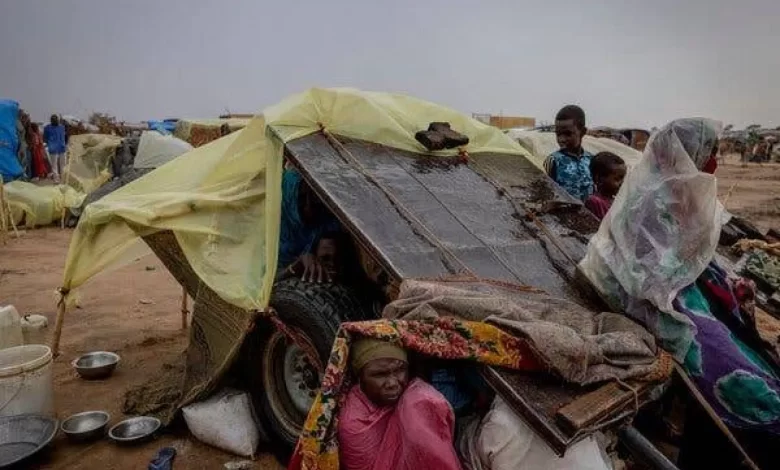Reports
Cold and Hunger are Killing Children, the Elderly, and Pregnant Women in Darfur

Sudan Events – Agencies
The skin of three-year-old Fatima clung to her thin bones due to severe hunger, while her mother, Hawa, also starving, anxiously awaited a small portion of food to be distributed by local associations known as “Takiya.” She says, “My daughter used to be cheerful and laughing, playing energetically with her peers, but now she can’t move due to hunger.” She continues, “We don’t have food, and if we get one meal, we are very happy. We have lost everything because of the war.”
In addition to hunger, the people who remain in the city of El Fasher, the capital of North Darfur, live in constant death coming from both the ground and the sky. While many have fled to displacement camps, death from shelling and starvation continues to follow them there. This was reported by Adam Rujal, spokesperson for the “Darfur Displaced and Refugee Coordination,” who told Asharq Al-Awsat that people in displacement camps in Darfur are living in extremely dire conditions. Those who have not died from bullets and flying shells, “have died from hunger, malnutrition, cold, and diseases.”
Rujal, who has defended the rights of displaced people since the first Darfur war in 2003, urged the army and the “Rapid Support Forces” to stop the war that has claimed more than 7,000 lives inside the displaced camps in Darfur, with their numbers now doubled. Before the war, there were about 3 million displaced people, but now there are more than 6 million living in 171 camps, 70% of them are women and children.
Describing the tragedy, Rujal depicted the worsening situation of the war, especially with the onset of winter and the severe cold, saying, “These days, children are dying from the cold.” He continues, “The artillery shelling from the Rapid Support Forces and the army aircraft in El Fasher forced the city’s residents to flee. After days, they reached areas in the Jebel Marra region, which are safe but lack basic necessities.”
He added, “Hundreds of those who fled with their bodies and souls live in the open and under trees, waiting for humanitarian aid and tents to protect them from the severe cold of Darfur. The sight of children looking for warmth breaks hearts, and the elderly are in the same situation.”
In addition to hunger and the severe cold, diseases and infections caused by the cold are increasing the death toll among children, the elderly, and pregnant women. Rujal emphasized, “People are in desperate need of shelter, food, and medicine.”
Last Sunday, the government denied the existence of a famine in the country, describing the “Integrated Food Security Phase Classification” report, which classified 5 new areas in Darfur as having entered the hunger phase, as “non-neutral” and contributing to prolonging the war. This came after days of announcing their suspension from the “UN Hunger Observatory,” which monitors hunger levels worldwide.
Since April 2024, the Rapid Support Forces have been besieging El Fasher, the only area in Darfur still under the control of the army. Its residents have been enduring the siege, shelling, and bombing by government aircraft, with no food or medicine available.
The United Nations Security Council intervened, asking the Rapid Support Forces to lift the siege on the city and stop the war to protect civilians, but to no avail, as the humanitarian catastrophe continues to escalate in the city and the surrounding displacement camps.
The “hungry” in the displacement camps are forced to eat animal feed and tree leaves to survive. Rujal stated that the humanitarian aid reaching the displaced is very limited compared to their number, and he called for increased aid. He continued, “Some trucks entering the region are intercepted by the Rapid Support Forces and other armed groups, and 60% of the relief materials are seized in some areas.”
The “Abu Shouk camp,” crowded with displaced people near El Fasher, is being heavily shelled, resulting in the deaths of hundreds. The Rapid Support Forces claim that the government-aligned forces “use the displaced as human shields,” while the army and joint forces state that the Rapid Support Forces target civilians.
Rujal criticized what he called the “silence of the world” regarding the condemnation of the shelling, focusing on one camp, Zimzam, while ignoring the Abu Shouk camp, which houses 200,000 people, some of whom have fled to the Longa area. He said, “The health conditions in Abu Shouk have become even more critical after the shelling of the only functioning health center in the camp.”
In addition to hunger, cold, and shelling, Rujal said, “Endemic diseases, such as malaria, are ravaging the displaced, leading to deaths among children, the elderly, and pregnant women, along with chronic diseases like high blood pressure and diabetes, as there is no medicine in the displacement camps.”



